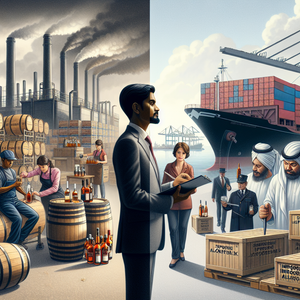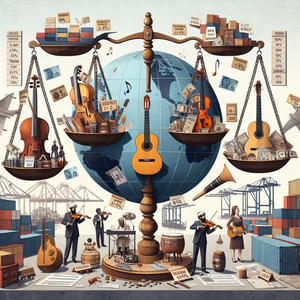
How Tariffs Are Transforming Careers in the Alcohol Industry: Opportunities, Challenges, and Strategic Adaptation
The alcohol industry is undergoing a seismic shift, driven by the economic ripple effects of tariffs that have disrupted global trade. With import duties climbing as high as 25% on certain products and retaliatory trade measures affecting international markets, the sector faces mounting challenges. From spiking production costs to supply chain disruptions, these trade barriers have reshaped the way businesses operate and altered the employment landscape. While the immediate effects include higher prices for consumers and reduced access to raw materials, the industry’s response has also unlocked a range of new opportunities. Companies are pivoting toward domestic sourcing, refining their trade compliance strategies, and rethinking supply chains to stay competitive. These changes are creating a demand for roles that didn’t exist or were less prominent just a few years ago. For professionals in the alcohol industry—or those looking to enter it—understanding how tariffs are driving this transformation is essential to thriving in this new job market. This article explores how tariffs are reshaping key roles within the alcohol industry, highlighting emerging opportunities, necessary skills, and actionable strategies for navigating this evolving terrain. By examining these trends, we provide insights into the challenges and opportunities shaping the future of the industry.
Job Summaries:
Trade Compliance Specialist: Navigating Complexity in Global Markets:
- As tariffs add layers of regulatory hurdles, Trade Compliance Specialists have become indispensable.
- These professionals ensure that imports and exports adhere to international trade laws, mitigating risks of penalties or delays.
- They manage documentation, monitor tariff classifications, and stay abreast of constantly shifting regulations.
- For instance, a U.S.-based importer of French wines brought on a compliance specialist to address new tariffs, reducing shipment delays and avoiding fines.
- A background in international business, trade law, or regulatory compliance, coupled with attention to detail and familiarity with global trade software, makes candidates highly valuable.
Supply Chain Analyst: The Problem-Solvers of Tariff Troubles:
- Supply chain disruptions and rising transportation costs have made Supply Chain Analysts crucial.
- These professionals analyze data to streamline operations, negotiate better shipping rates, and identify cost-saving opportunities such as sourcing local materials.
- One craft distillery shifted to domestic suppliers for ingredients like barley, cutting costs while maintaining product quality.
- Expertise in analytics platforms like SAP or Tableau and a degree in supply chain management are major assets for this role.
Domestic Sourcing Manager: Localizing for Resilience:
- With tariffs driving up the cost of imported goods, businesses are increasingly turning to domestic suppliers.
- Domestic Sourcing Managers play a pivotal role in identifying and negotiating with these suppliers to maintain a consistent flow of quality raw materials.
- A mid-sized brewery slashed costs by 15% annually after switching to a U.S.-based aluminum supplier for packaging.
- This role not only reduces dependency on volatile trade policies but also aligns with the growing consumer demand for locally sourced products.
Distillery Operations Manager: Innovating for Efficiency:
- Distillery Operations Managers adapt production processes to mitigate financial strain caused by tariffs.
- They source alternative ingredients or improve energy efficiency to ensure profitability.
- A gin distillery replaced imported botanicals with locally sourced alternatives, cutting costs and appealing to environmentally conscious consumers.
- Strong leadership, problem-solving skills, and innovation under pressure are essential for success in this role.
Export Manager: Rewriting the Global Playbook:
- As tariffs disrupt international pricing structures, Export Managers are tasked with finding new markets and optimizing trade strategies.
- These professionals work closely with market analysts and logistics teams to develop competitive pricing models and navigate complex trade agreements.
- A whiskey brand reallocated its focus from Europe to emerging Asian markets, where tariff impacts were less severe, offsetting revenue losses.
- A deep understanding of global trade policies and strong negotiation skills are crucial for thriving in this role.
Beverage Industry Economist: Forecasting the Future:
- Economists specializing in the alcohol industry offer critical insights into how tariffs are influencing market trends, consumer behavior, and company financials.
- By forecasting risks and identifying opportunities, they help businesses adapt to an unpredictable landscape.
- U.S. whiskey exports to the EU dropped 37% after retaliatory tariffs, underscoring the need for informed economic strategies.
- Their expertise helps companies navigate uncertainty and make data-driven decisions for growth.
Customs Broker: Simplifying the Red Tape:
- Customs Brokers play an increasingly vital role in ensuring smooth cross-border alcohol shipments.
- They manage the mountain of paperwork required to comply with tariff regulations and prevent costly delays.
- A craft beer exporter avoided $50,000 in penalties when their broker ensured proper tariff classification for shipments to Canada.
- These professionals are indispensable for companies dealing with international trade.
Corporate Strategist: Preparing for the Long Game:
- Corporate Strategists help businesses adapt to the new tariff-driven realities by developing long-term plans.
- From identifying growth opportunities to mitigating risks, they play a central role in steering companies toward resilience.
- A spirits company pivoted to ready-to-drink (RTD) cocktails, a booming category less reliant on imported ingredients, increasing profits by 12%.
- Strategic vision, market analysis, and financial acumen make this role a cornerstone of industry adaptation.
Brand Manager: Winning Consumer Loyalty:
- Tariffs have driven up prices, making it more challenging to retain customers.
- Brand Managers oversee campaigns that highlight quality, value, and innovation, helping brands maintain their market share.
- Leveraging “buy local” campaigns has helped many brands capitalize on consumer preference for domestic products.
- Creativity, consumer insight, and a knack for storytelling are essential for success.
Packaging Procurement Manager: Redefining Sustainability:
- With tariffs increasing the cost of materials like glass and aluminum, Packaging Procurement Managers are exploring alternative solutions.
- Sustainable packaging options are gaining traction as they reduce both costs and environmental impact.
- Many distilleries now use biodegradable or recycled packaging, saving money while appealing to eco-conscious consumers.
- This role is pivotal in balancing cost management with brand values.
The alcohol industry’s transformation under the weight of tariffs has been both a challenge and an opportunity. New job roles and responsibilities have emerged as businesses adapt to tighter regulations, higher costs, and shifting consumer preferences. From Trade Compliance Specialists to Domestic Sourcing Managers, professionals who embrace innovation, resilience, and strategic thinking will thrive in this evolving landscape. For job seekers, now is the time to build skills in areas like supply chain management, trade compliance, and strategic planning. For businesses, collaboration and forward-thinking approaches will be key to navigating this turbulent market and uncovering opportunities for growth. Tariffs may be reshaping the alcohol industry, but they are also catalyzing innovation and resilience. By staying informed and adaptable, professionals and businesses alike can turn these challenges into a platform for long-term success.
Explore More Jobs

